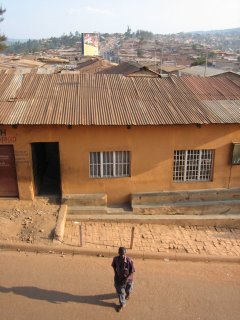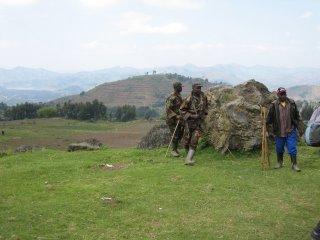My students asked me yesterday what I was going to give them for World Refugee Day. I said “um, English class?” I’m under strict instructions not to give them anything, for fear that word will spread and people will come to the class just to get a pen, a piece of paper, or a cheap notebook costing 25cents. So when I began today’s lesson with “this is your day,” they understandably looked at me like I was a bit nuts. So I asked them what the idea of a world day to remember refugees means to them. Not much: “today they are talking about us, but tomorrow they will have already forgotten.” I decided to abandon the day’s lesson plan and give them a chance to talk. I did feel a bit guilty getting them to educate me when I am supposed to be educating them, but they didn’t mind. They said maybe when I went back to my country I could tell people what I learned. They really want people to know that they exist and that they are suffering. So below are a few very random and disjointed notes I was able to cobble together from conversations with my students today, and on a few other occasions.
“We refugees are like animals. An animal doesn’t know when it’s going to die. It can only wait in its pen for the end to come.”
They don’t want to go to the camps. They say
Who are these enemies? It varies from person to person. One student of mine was the son of a government minister in
Even though
Who is protecting refugees? One man, in his 40’s (the same man with whom I got into a heated debate about religion and marriage a few weeks ago) was a preacher in
They can’t even really rely on UNHCR to be looking out for them. A related story that I heard from Lucy, one of the directors of RLP: A woman wanted to complain about her camp commandant. He was raping her. She needed his permission to go to
They also don’t trust Inter-Aid, UNHCR’s implementing partner in
“If you go to the police to tell them about an incident, they won’t believe you. They will say you did it to yourself. They say ‘you people cut yourself, you burn your houses.’ Even if you get all the neighbors to say what happened they won’t believe you. But if you pay them some money, then they may believe you. They will write you a letter that you can take to OPM. But sometimes, even if you pay the police, they will give you a letter but then they will call OPM and say ‘don’t believe this man, he is a liar who paid a bribe.’”
I don’t know how much of any of their stories are real. I have heard (again and again) from Noah my intern supervisor that I shouldn’t trust them. That they have every incentive to make up stories. Rumors of resettlement spread like wildfire: they hear that one person got resettled by telling a certain story, and all of the sudden everyone is telling the same story. They know that insecurity is the only way to get resettlement. The whole system seems set up to punish honesty. Noah told me how Inter-Aid, JRS or other relief organizations will help single women before women with husbands because in theory they are less likely to be able to support themselves. But when husbands can’t work because no one will hire them because they are refugees, this is not necessarily true. Other organizations only help AIDS widows; women whose husbands who died of any other cause are ineligible for aid. In this situation terms like honor, honesty, morality, seem bankrupt. When the choice is lie, or let your kids starve, doing the ‘right’ thing seems pretty foolish. You could make the argument that they are only hurting themselves, that a few people scamming the system ruin it for everyone, that if everyone played by the rules, they’d all be better off. But this argument rests on the assumption that the rules are fair, that UNHCR, Inter-Aid, the Ugandan government, all hold refugees’ best interests near and dear to their hearts. That none of these organizations have any vested interest, any financial or institutional stake in remaining in the refugee business.
It is very possible that my students believe they have an incentive to lie to me. Maybe they hope that if I believe them I will be able to pull some strings (imaginary strings I definitely do not have my hands on) and get them resettled. It might only be indicative of the incredible depths of my naïveté to say this, but I believe that much of what they are saying is true, at least on some level. Then again, maybe they are taking me for a ride. Fine. I can live with that. I can understand how some of the lawyers may get frustrated: they work hard every day for clients, putting themselves on the line for them, supporting them and their stories to OPM and UNHCR, and then they are made to look foolish when it comes out that the client was lying. But it’s not like the people who are lying to me are laughing all the way to the bank. They are desperate people, with precious little hope. I’d rather believe them and be proven wrong than not believe them and be proven right. As Lucy said “better they take us for fools than fascists.”
Beyond the dubious value of studying English with me six hours a week, perhaps the only thing I can give my students is a voice. I hope I have presented them as they are: men and women struggling to hold onto their humanity in an extremely de-humanizing situation. Though I have speculated whether or not they are ‘using me,’ I don’t have to speculate, I know, that on some level I am using them, appropriating their suffering and turning it into another colorful anecdote for my blog. Being conscious of this does not excuse it. In writing about my students I’ve tried to avoid anecdotalizing them. I’ve done my best to be faithful to them and their concerns large and small. I apologize if I have been unfaithful to their trust in me, or misrepresented them in any way.
Traveling by bodaboda is dangerous. It's basically a low-speed motorcycle. But I always wear my helmet, and I only go by boda when absolutely necessary. I can get to many places by matatu (bus-taxi). Though it takes a little longer, I usually use that method. Sometimes the bodas are necessary, but I try to take them as little as possible. So please don't worry too much: all travel involves some risk but I'm doing the best I can to mimimize it.



































